“情态动词+have-done”重点讲解课件
- 格式:ppt
- 大小:938.00 KB
- 文档页数:35
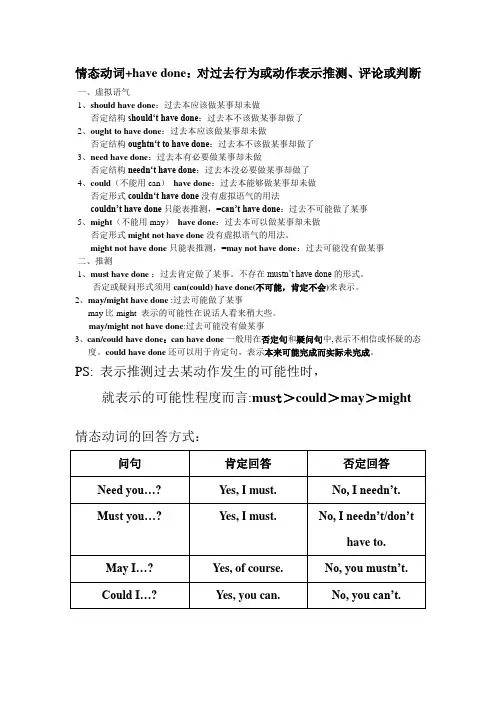
情态动词+have done:对过去行为或动作表示推测、评论或判断一、虚拟语气1、should have done:过去本应该做某事却未做否定结构should‘t have done:过去本不该做某事却做了2、ought to have done:过去本应该做某事却未做否定结构oughtn‘t to have done:过去本不该做某事却做了3、need have done:过去本有必要做某事却未做否定结构needn‘t have done:过去本没必要做某事却做了4、could(不能用can)have done:过去本能够做某事却未做否定形式couldn‘t have done没有虚拟语气的用法couldn’t have done只能表推测,=can’t have done:过去不可能做了某事5、might(不能用may)have done:过去本可以做某事却未做否定形式might not have done没有虚拟语气的用法。
might not have done只能表推测,=may not have done:过去可能没有做某事二、推测1、must have done:过去肯定做了某事。
不存在mustn’t have done的形式。
否定或疑问形式须用can(could) have done(不可能,肯定不会)来表示。
2、may/might have done :过去可能做了某事may比might 表示的可能性在说话人看来稍大些。
may/might not have done:过去可能没有做某事3、can/could have done:can have done一般用在否定句和疑问句中,表示不相信或怀疑的态度。
could have done还可以用于肯定句,表示本来可能完成而实际未完成。
PS: 表示推测过去某动作发生的可能性时,就表示的可能性程度而言:mus t>could>may>might 情态动词的回答方式:。
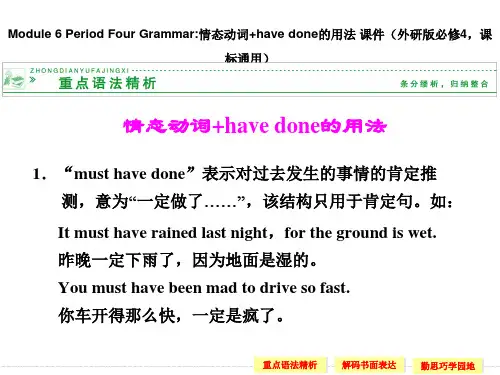
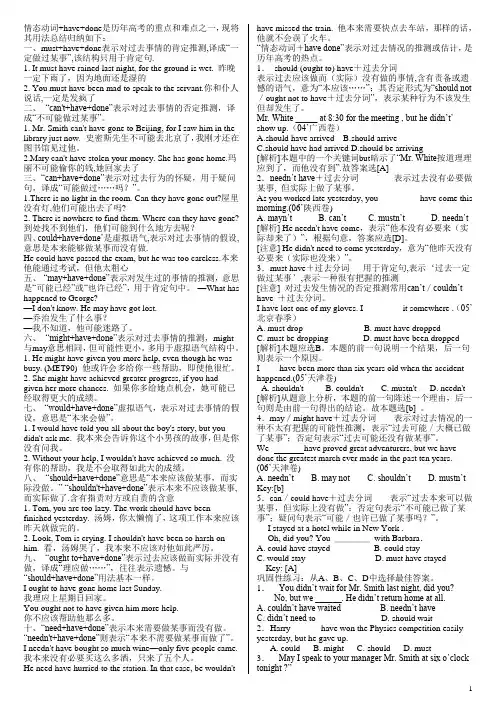
情态动词+have+done是历年高考的重点和难点之一,现将其用法总结归纳如下:一、must+have+done表示对过去事情的肯定推测,译成“一定做过某事”,该结构只用于肯定句.1. It must have rained last night, for the ground is wet. 昨晚一定下雨了,因为地面还是湿的2. You must have been mad to speak to the servant.你和仆人说话,一定是发疯了二、“can't+have+done”表示对过去事情的否定推测,译成“不可能做过某事”。
1. Mr. Smith can't have gone to Beijing, for I saw him in the library just now. 史密斯先生不可能去北京了,我刚才还在图书馆见过他。
2.Mary can't have stolen your money. She has gone home.玛丽不可能偷你的钱,她回家去了三、“can+have+done”表示对过去行为的怀疑,用于疑问句,译成“可能做过……吗?”。
1.There is no light in the room. Can they have gone out?屋里没有灯,他们可能出去了吗?2. There is nowhere to find them. Where can they have gone? 到处找不到他们,他们可能到什么地方去呢?四、could+have+done’是虚拟语气,表示对过去事情的假设,意思是本来能够做某事而没有做.He could have passed the exam, but he was too careless.本来他能通过考试,但他太粗心五、“may+have+done”表示对发生过的事情的推测,意思是“可能已经”或“也许已经”,用于肯定句中。
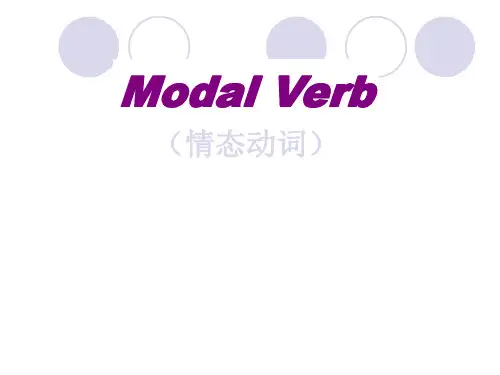
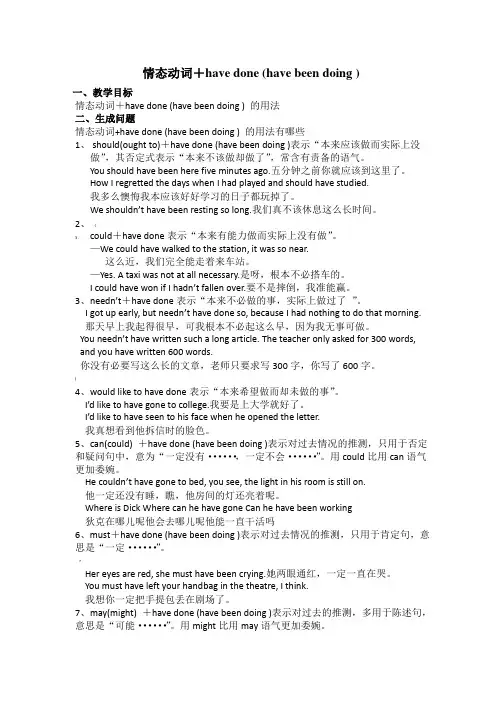
情态动词+have done (have been doing )一、教学目标情态动词+have done (have been doing ) 的用法二、生成问题情态动词+have done (have been doing ) 的用法有哪些1、should(ought to)+have done (have been doing )表示“本来应该做而实际上没做”,其否定式表示“本来不该做却做了”,常含有责备的语气。
You should have been here five minutes ago.五分钟之前你就应该到这里了。
How I regretted the days when I had played and should have studied.我多么懊悔我本应该好好学习的日子都玩掉了。
We shouldn’t have been resting so long.我们真不该休息这么长时间。
2、《3、could+have done表示“本来有能力做而实际上没有做”。
—We could have walked to the station, it was so near.这么近,我们完全能走着来车站。
—Yes. A taxi was not at all necessary.是呀,根本不必搭车的。
I could have won if I hadn’t fallen over.要不是摔倒,我准能赢。
3、needn’t+have done表示“本来不必做的事,实际上做过了”。
I got up early, but needn’t have done so, because I had nothing to do that morning.那天早上我起得很早,可我根本不必起这么早,因为我无事可做。
You needn’t have written such a long article. The teacher only asked for 300 words, and you have written 600 words.你没有必要写这么长的文章,老师只要求写300字,你写了600字。
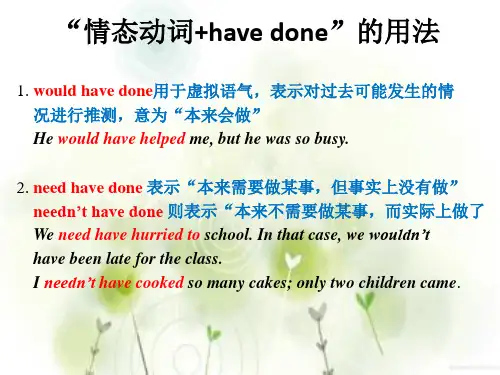


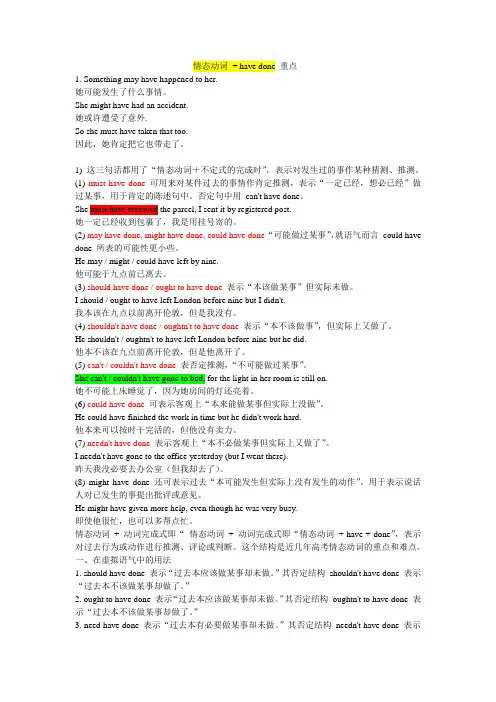
情态动词+ have done 重点1. Something may have happened to her.她可能发生了什么事情。
She might have had an accident.她或许遭受了意外.So she must have taken that too.因此,她肯定把它也带走了。
1) 这三句话都用了“情态动词+不定式的完成时”,表示对发生过的事作某种猜测、推测。
(1) must have done 可用来对某件过去的事情作肯定推测,表示“一定已经,想必已经”做过某事,用于肯定的陈述句中。
否定句中用can't have done。
She must have received the parcel, I sent it by registered post.她一定已经收到包裹了,我是用挂号寄的。
(2) may have done, might have done, could have done “可能做过某事”,就语气而言could have done 所表的可能性更小些。
He may / might / could have left by nine.他可能于九点前已离去。
(3) should have done / ought to have done表示“本该做某事”但实际未做。
I should / ought to have left London before nine but I didn't.我本该在九点以前离开伦敦,但是我没有。
(4) shouldn't have done / oughtn't to have done 表示“本不该做事”,但实际上又做了。
He shouldn't / oughtn't to have left London before nine but he did.他本不该在九点前离开伦敦,但是他离开了。
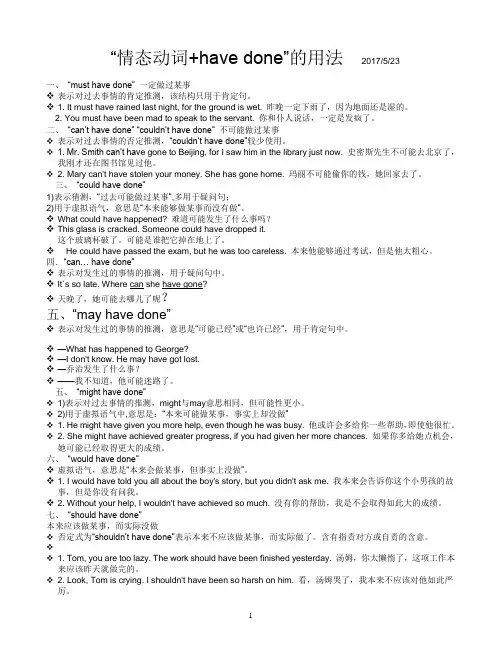
“情态动词+have done”的用法2017/5/23一、“must have done” 一定做过某事表示对过去事情的肯定推测,该结构只用于肯定句。
1. It must have rained last night, for the ground is wet. 昨晚一定下雨了,因为地面还是湿的。
2. You must have been mad to speak to the servant. 你和仆人说话,一定是发疯了。
二、“can’t have done” “couldn’t have done” 不可能做过某事表示对过去事情的否定推测,“couldn’t have done”较少使用。
1. Mr. Smith can’t have gone to Beijing, for I saw him in the library just now. 史密斯先生不可能去北京了,我刚才还在图书馆见过他。
2. Mary can't have stolen your money. She has gone home. 玛丽不可能偷你的钱,她回家去了。
三、“could have done”1)表示猜测,“过去可能做过某事”,多用于疑问句;2)用于虚拟语气,意思是“本来能够做某事而没有做”。
What could have happened? 难道可能发生了什么事吗?This glass is cracked. Someone could have dropped it.这个玻璃杯破了。
可能是谁把它掉在地上了。
He could have passed the exam, but he was too careless. 本来他能够通过考试,但是他太粗心。
四.“can… have done”表示对发生过的事情的推测,用于疑问句中。
It`s so late. Where can she have gone?天晚了,她可能去哪儿了呢?五、“may have done”表示对发生过的事情的推测,意思是“可能已经”或“也许已经”,用于肯定句中。
